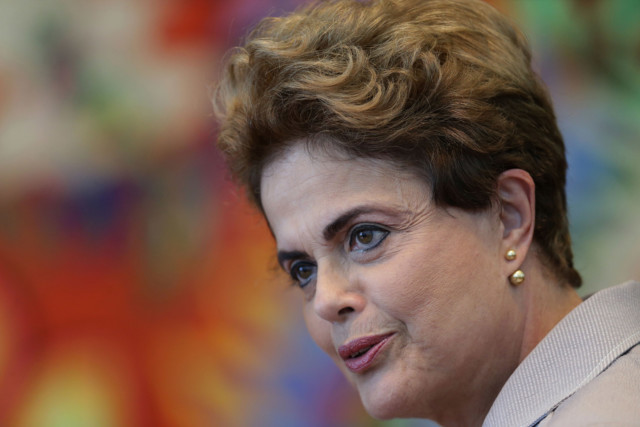While all the world has eyes on the Rio Olympics, Brazil’s Senate on Wednesday voted to put suspended President Dilma Rousseff on trial for allegedly breaking fiscal rules in managing the federal budget.
CCTV America’s Paulo Cabral reports

After 15 hours of debate, senators voted 59-21 to send her to trial, which is expected later this month.
The outcome was widely expected: The Senate voted in May to impeach and remove Rousseff from office for up to 180 days while the trial was prepared.
The vote underscored that efforts to remove her have gained steam despite her attempts to woo senators who have expressed doubt about the governing ability of interim President Michel Temer.
Senators pushing for her removal only needed a simple majority to call for the trial. Not only did they get much more than that, they also garnered an ample margin over the super-majority — at least 54 — they will need to permanently remove her.
Paulo Sotero on Brazilian President Dilma Rousseff impeachment vote
For more context on the Rousseff trial, CCTV America’s Mike Walter spoke to Paulo Sotero, a longtime Brazilian journalist and director of the Brazil Institute at the Woodrow Wilson International Center for Scholars.
“This is not an easy situation,” Jose Eduardo Cardozo, who was attorney general in Rousseff’s administration and is leading her defense, told Brazilian news portal G1 after the vote in the capital of Brasilia.
Cardozo said there was still hope. He said he would look at appeals to the nation’s top court and that several senators who voted in favor of this move may be reluctant to take the heavier step of removing her from office.
“In that way, the final vote isn’t tethered to today’s result,” he said.
Still, the situation does not look hopeful for Rousseff, the first female president in Latin America’s largest nation. Previous appeals to the Supreme Federal Tribunal, the nation’s top court, have failed. And Rousseff’s attempts to woo senators since May and rebuild her own brand with voters have apparently fallen short.
Temer, who was Rousseff’s vice president-turned-nemesis, took over after Rousseff’s May impeachment. He has been sharply criticized for appointing a Cabinet of all white men in a country where more than 50 percent are non-white. Three of his ministers have been forced to resign for allegations related to corruption, and despite promises to get Congress moving after months of paralysis, he has struggled to push through reforms.
Meanwhile, Brazilian protesters at the Olympic games in Rio have been making their opinions known on the matter.

Fans in the stands hold a Swedish flag and signs that read in Portuguese “Temer Out” and “Out, you know who” in reference to Brazil acting president Michel Temer, during a group E match of the women’s Olympic football tournament between China and Sweden at the National Stadium in Brasilia, Brazil, Tuesday, Aug. 9, 2016. (AP Photo/Eraldo Peres)
Rousseff has repeatedly said she did nothing wrong. She has argued that other former presidents did similar things in their handling of the federal budget. She has argued that behind her removal are attempts to tamp down a wide-ranging corruption probe into billions of dollars in alleged kickbacks in state oil company Petrobras.
Dozens of top businessmen and politicians have been jailed in the two-year investigation. While much of the graft happened during the 13 years her Workers’ Party was in power, Rousseff repeatedly declined to do anything to squelch the investigation. She argued that the probe was badly needed in Brazil, where graft in politics is endemic. Investigators in the Petrobras case have said the company even had a department to handle bribes.
Story compiled with sources from the Associated Press
David Fleischer on Brazilian President Dilma Rousseff impeachment vote
For more on Brazilian President Dilma Rousseff impeachment vote, CCTV America’s Asieh Namdar spoke to David Fleischer, Emeritus Professor at the University of Brasilia.
 CGTN America
CGTN America Brazil’s Senate voted Wednesday, Aug. 10, 2016, to put Rousseff on trial for allegedly breaking fiscal rules in her managing of the federal budget. (AP Photo/Eraldo Peres, File)
Brazil’s Senate voted Wednesday, Aug. 10, 2016, to put Rousseff on trial for allegedly breaking fiscal rules in her managing of the federal budget. (AP Photo/Eraldo Peres, File)
